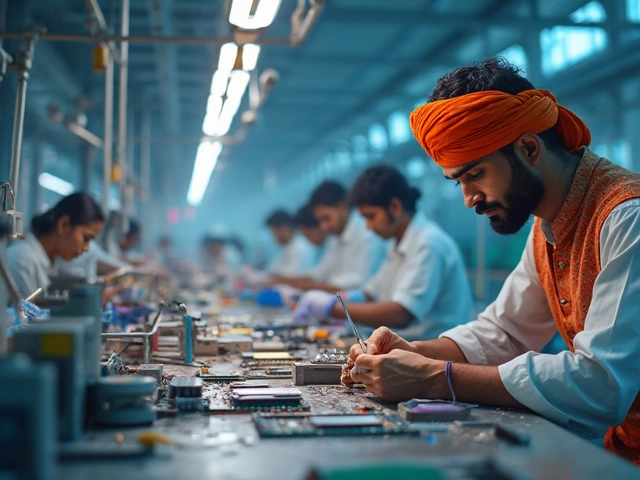Starting a business in the manufacturing sector offers unique opportunities and challenges. With the steady rise in demand for innovative products, there is a vast potential waiting to be tapped. By examining current market needs and technological trends, one can find resilient business ideas that are less likely to fail.
In this article, we will take an insightful journey through some of the most promising manufacturing startup ideas. From understanding crucial market dynamics to leveraging the power of technology, aspiring entrepreneurs can arm themselves with vital knowledge for success.
Let's explore how you can ensure your manufacturing venture not only survives but thrives in an ever-evolving landscape.
- Understanding the Manufacturing Landscape
- Identifying Market Needs and Trends
- Top Resilient Manufacturing Ideas
- Leveraging Technology for Success
- Tips for New Entrepreneurs
- Success Stories to Inspire
Understanding the Manufacturing Landscape
Navigating the manufacturing landscape requires an appreciation of history, the present context, and future potential. This sector has long been the backbone of the global economy, responsible for creating the very things that shape our everyday lives. From the initial phases of the Industrial Revolution to today's advanced technological innovations, manufacturing has consistently demonstrated resilience and adaptability. While each era has seen its own challenges, the quest for efficiency, cost-effectiveness, and quality remains an enduring theme.
In today's economic climate, understanding the current landscape involves recognizing challenges like globalization, labor dynamics, and technological advancements. The shift towards sustainable practices is redefining how industries operate, emphasizing eco-friendly production methods and reducing the carbon footprint. Technology serves as both a driving force and a challenge, with automation and artificial intelligence playing significant roles. Recognized sources note that by 2023, over 25% of production tasks across major industries were automated. Embracing such technologies can help businesses reduce costs and improve product consistency but requires an initial investment and a commitment to continual learning.
"The future of manufacturing is not just driven by technology, but by the marriage of innovation and sustainability," says Jane Stevenson, a renowned expert in industrial transformation. This underscores the need for entrepreneurs to stay informed and adaptable, aligning their strategies with both emerging technologies and market demands.
The global pandemic accelerated shifts within the manufacturing landscape, highlighting the importance of agility and adaptability. Many businesses that invested in technological infrastructure found themselves better equipped to handle disruptions. In contrast, those reliant on traditional methods faced more significant obstacles. Understanding and navigating this delicate balance is crucial for entrepreneurs looking to make a mark in the manufacturing sector. Surveys indicate that businesses integrating smart technology solutions saw a 30% increase in production efficiency, showcasing the benefits of foresight in investment and planning.
Looking ahead, knowing the market, aligning with consumer preferences, and leveraging information are vital. Entrepreneurs must actively monitor trends, such as the rising need for personalized products and rapid delivery times. Staying informed about new materials, production methods, and logistics can provide a competitive edge. The ability to foresee and react to upcoming challenges and opportunities will differentiate unsuccessful endeavors from thriving enterprises. Ultimately, understanding the manufacturing landscape is about recognizing not only the tools of today but also the trends of tomorrow, guiding strategic decisions that ensure fewer failures and greater successes in your manufacturing business.
Identifying Market Needs and Trends
Understanding what the market wants is crucial for any manufacturing business, especially when you're venturing into new territory. The first step involves keenly observing consumer behavior, which often sheds light on underlying needs. For example, as people become more environmentally conscious, there's a marked increase in the demand for sustainable and eco-friendly products. It has become a noticeable trend that more businesses are going green, not just for the planet's sake, but also because it attracts eco-conscious consumers.
Technology also plays a significant role in shaping market trends. The rise of the Internet of Things (IoT) and smart devices has spilled over into the manufacturing sector, requiring businesses to innovate continuously. A trend worth noting is additive manufacturing, commonly referred to as 3D printing. This technology has revolutionized prototyping and production processes, leading to more customized products and shorter lead times.
Moreover, the rapid advancement of digital technologies has changed the way businesses interact with their customers, leading to a trend toward more personalized consumer experiences. Using customer data analytics, companies can tailor their offerings to meet specific consumer demands, providing a competitive edge in today's dynamic market.
Analyzing Industry Reports
It's also essential to delve into industry reports and data when identifying trends. Reports from reputable institutions can provide invaluable insights. For instance, a recent report by Deloitte highlighted that digital transformation is not just a trend, but a necessity for the survival and growth of companies in the manufacturing sector. Such insights can help one align their strategic goals with where the industry is headed.
"Digital connectedness is the bridge for companies striving to move from surviving to thriving," noted a senior analyst in the Deloitte report.
Industry reports also offer quantitative data illustrating market shifts, customer preferences, and emerging technologies. This data becomes the groundwork upon which new business ideas can grow. Additionally, staying updated with competitors' innovations offers another angle of understanding market demands, enabling the crafting of better business strategies.
Social Listening and Customer Feedback
Listening to the voice of the customer can unveil aspects that lengthy reports might overlook. Engaging with customers through social media, surveys, and feedback forms provides a direct insight into what they value and expect from products. Social listening, where companies actively track conversations around their brand or industry, helps to pinpoint emerging consumer trends.
These conversations often reveal unmet needs, complaints about existing products, or desires for new features, which businesses can capitalize on. By actively engaging and adapting to these insights, a manufacturing startup can tailor its offerings to be more in line with actual market needs, increasing its chances of success.

Top Resilient Manufacturing Ideas
When it comes to choosing a manufacturing business, resilience is key. The goal is to find an idea that not only thrives through economic fluctuations but also takes advantage of societal needs and evolving technology. One area seeing significant growth is sustainable and eco-friendly products. As global awareness about climate change increases, consumers are demanding goods that are kinder to the planet. This demand opens up numerous opportunities for manufacturers who can innovate in sectors like recyclable packaging, biodegradable materials, and even renewable energy products. An interesting success story is that of a company that makes biodegradable cutlery, which saw a 300% increase in sales after major fast-food chains started banning single-use plastics.
Another booming area is health and wellness, a sector expected to reach staggering heights in the coming years. The recent pandemic has accelerated interest in personal health, wellness supplements, exercise equipment, and home fitness products. Manufacturing companies tapping into this trend can aim for fitness tech gadgets, nutritional supplements, and home gym accessories. Crafting unique products in this arena, such as customizable wearables or smart fitness devices, offer a competitive edge. A source from
Forbes highlights, "The health and wellness sector is projected to grow annually by 6% through 2025, proving its robustness as a manufacturing domain."
Technology advancements are reshaping every industry, and manufacturing is no exception. The integration of artificial intelligence and automation in production processes has improved efficiency and reduced labor costs. Companies developing AI-enabled machines or robotics tailored for specific industries, such as agriculture or healthcare, have seen increased demand. One highly promising area is 3D printing, which offers cost-effective solutions for creating prototypes and custom designs. A manufacturer's ability to adapt and capitalize on these technological advances often proves crucial for success and longevity.
Let's not forget niche markets like luxury goods and bespoke products. While mass production has its merits, there's a burgeoning trend toward personalized, handcrafted items that cater to individual tastes. Whether it's custom furniture, artisanal foods, or handcrafted jewelry, manufacturers who excel in craftsmanship and personalization can capture significant market share. This trend leans into the consumer desire for unique and meaningful products, often creating smaller, more durable businesses that thrive in their exclusivity. In capturing the essence of boutique manufacturing, these companies often enjoy partnerships and collaborations with independent retailers, creating synergies that benefit all parties involved.
Lastly, food manufacturing continues to do well, especially with the rising demand for healthy and organic options. The food industry is seeing shifts towards plant-based alternatives and organic products. Manufacturing companies producing plant-based proteins or innovative food products that cater to dietary restrictions stand to benefit in this expanding market. Specifically, the demand for almond, soy, and oat-based milk alternatives is expected to increase by nearly 14% over the next few years. For entrepreneurs looking at the manufacturing sector, delving into the intersection of food and innovation can provide not just a resilient business model, but also the chance to contribute positively to food sustainability and security.
Leveraging Technology for Success
To thrive in the manufacturing sector, embracing technology is more than advantageous—it's essential. As industrial processes modernize, those willing to adapt by implementing cutting-edge technological solutions gain a clear competitive advantage. A prime example is the integration of automation and robotics, which can significantly streamline production. Not only do these technologies boost efficiency, but they also ensure higher precision and lower error rates. Many companies report reductions in production costs and maximized resource utilization, owing largely to robotic advancements.
Another pivotal component of resilient manufacturing business success is adopting the Internet of Things (IoT). By interconnecting equipment and systems, companies can access valuable real-time data, which assists in predictive maintenance and reduces downtime. This, in turn, leads to substantial cost savings. Sensor technology allows for constant monitoring of production lines, ensuring swift action to address potential issues before they escalate.
In today's technologically driven world, digital twins offer significant benefits. Essentially, a digital twin is a virtual replica of a physical product, system, or production line. It allows businesses to simulate and analyze changes in a risk-free virtual environment, thus refining processes and improving efficiency without costly trial and error in real life. This innovation supports proactive strategies by highlighting potential improvements and uncovering issues that may not be visible otherwise.
Adoption of augmented reality (AR) enhances training and maintenance within the manufacturing realm. AR can provide visual guidance during the assembly of products or in navigating complex machinery repairs. This technology reduces training times and allows workers to perform their tasks with greater confidence. According to a recent study by Deloitte, companies utilizing AR and VR technologies have seen a productivity increase of nearly 30% within two years of their implementation.
"In today's quick-paced world, manufacturers must harness the full power of technology to stay competitive and meet market demands," says Mary Barra, an influential voice in the automotive industry.
Finally, embracing AI-driven analytics can lead to more informed decision-making processes. Analyzing vast amounts of data to recognize patterns and draw insights results in more agile and responsive businesses. Whether it's forecasting demand, optimizing supply chain logistics, or enhancing customer experiences, AI holds the key to unlocking new potentials within the manufacturing industry.
For any burgeoning manufacturing startup, staying attuned to technological advancements is crucial. A forward-thinking approach will not only bolster operational capabilities but also ensure a sustainable, competitive edge in the ever-evolving industrial landscape.

Tips for New Entrepreneurs
Embarking on a journey into the manufacturing business can be both exhilarating and daunting for new entrepreneurs. It's crucial to build a strong foundation from the very beginning to set the stage for success. First, aspiring business owners should thoroughly research the market trends they wish to tap into. Understanding consumer needs is paramount. It enables a new business to not only meet but also anticipate demand shifts that could prove costly if overlooked. Consider observing market leaders and identifying gaps they haven't addressed. This might present opportunities for innovation or specialization that may not seem obvious at first glance.
Networking is another invaluable element that cannot be understated. Establishing connections with individuals who have experience in the industry can provide insights and advice that books and courses might not cover. They can offer feedback on your strategies and may even introduce you to potential partners or investors who can contribute to your success. Joining industry-specific associations or groups is a great way to meet such people. Additionally, it's wise to stay informed about advancements in technology that could influence the manufacturing industry. Often, innovation can be the key differentiator that sets a startup apart.
Securing funding is often a major hurdle for many startups. It's crucial to create a comprehensive business plan that outlines your strategy, goals, and projected financials. This plan should be convincing enough not only for potential investors but also as a roadmap for your business. Evaluate different funding options such as venture capital, angel investors, or even crowdfunding platforms which have gained popularity and can help reach a wider audience with your product idea. It's essential to know your numbers and be prepared to demonstrate potential profitability during any pitch.
If you're considering the production of tangible goods, location is a critical aspect to take into account. Pick a location that optimizes logistics, accesses the right talent pool, and ensures minimal overhead costs. Establishing a resilient industry often means being smart about your supply chain from the get-go. Negotiate favorable terms with suppliers to reduce costs and have contingency plans to tackle any disruptions. An efficient supply chain can significantly impact the ability to fulfill customer orders in a timely manner, which is important for maintaining brand reputation.
As
Steve Jobs once said, "Innovation distinguishes between a leader and a follower."Utilize feedback during the initial launch phases to fine-tune your products or services. Introducing small-scale trials or prototypes to gather real-world reactions can offer valuable insights. Consumers can provide feedback that might not have been initially considered, allowing for improvements before market-wide release. This approach encourages customer involvement, potentially building a loyal user base from the start.
Business success is rarely the result of a solitary effort; it often requires building a team that shares a unified vision. Focus on hiring individuals who fit your company’s culture and bring diverse perspectives. Encourage open communication and creative thinking within the team to nurture an atmosphere where innovation thrives. Remember that perseverance combined with flexibility can pave the way to overcoming the diverse challenges that every startup is bound to face. Stay resilient, and keep pushing toward your goals.
Success Stories to Inspire
In the dynamic world of manufacturing business, certain stories stand as a beacon of hope for budding entrepreneurs. One such story is that of Spanx, founded by Sara Blakely. With just $5,000 and a tenacious spirit, she transformed the idea of footless pantyhose into a global brand, showcasing how innovative thinking can lead to monumental success. Her journey is a testament to the power of addressing a niche market need while continuously believing in one's product, even when others don't see the vision. The company's rise to prominence emphasizes the importance of adaptability and understanding what consumers seek.
Sara Blakely once said, "It's important to be willing to make mistakes. The worst thing that can happen is you become memorable."
Another compelling example within the resilient industry of manufacturing is the story of Zipline. While relatively new, Zipline has carved a niche by delivering medical supplies via drones, especially in remote areas. Their supply chain ingenuity during the Ebola crisis demonstrated the powerful synergy between technology and humanitarian needs. By using cutting-edge drone technology, Zipline demonstrated how startups could solve real-world problems innovatively. Their success underlines the value of considering both the product and its broader impact, where technology plays a crucial role in enhancing reach and efficiency.
To draw insights from a different sector, we look at Warby Parker in the eyewear manufacturing segment. Recognized for revolutionizing how glasses are sold, the founders introduced a direct-to-consumer model, reducing costs significantly, and they paired it with a stylish flair that appealed to modern buyers. Their bold move to forgo traditional retail methods has resulted in a strong consumer base and illustrated the potential of rethinking traditional business models. A commitment to high-quality products coupled with a pledge to social responsibility – for every pair sold, a pair is distributed to someone in need – amplified their brand value significantly.
Inspiring stories don't just spark ideas; they demonstrate the underlying principles of perseverance, innovation, and a deep understanding of the market. For enthusiastic entrepreneurs hoping to dive into the manufacturing arena, these stories reveal that the path to success is not without its hurdles. It's about being willing to pivot when needed, to learn constantly and to maintain a focus on the core mission. There's a lot to learn from those who have walked the path before, as they light the way forward through their achievements and the legacy they leave behind.






